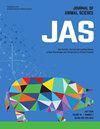用完整的豆粕蛋白代替玉米和合成氨基酸对生长猪的生长性能、胴体组成、血液细胞因子或肠道氨基酸转运蛋白mRNA丰度没有影响,但豆粕饲粮的净能量往往更高
IF 2.9
2区 农林科学
Q1 AGRICULTURE, DAIRY & ANIMAL SCIENCE
引用次数: 0
摘要
本试验验证了在玉米-豆粕型饲粮中降低饲粮粗蛋白质不会增加饲粮净能,也不会影响猪的生长性能、胴体组成、营养物质沉积、肠道形态或免疫状态的假设。降低豆粕含量,增加玉米和合成氨基酸含量的4种饲粮,蛋白质水平分别为20.0%、16.4%、15.4%和13.4%。试验猪(初始体重:32.2±4.2 kg)饲喂28 d,收集样品,评估体组成、肠道形态、血液标志物和氨基酸转运蛋白mRNA丰度。结果表明,降低饲粮蛋白质水平对猪的各项特性均无影响,但净能量随饲粮中豆粕含量的减少而降低。综上所述,在低蛋白质饲粮中添加合成氨基酸可以维持仔猪的生长性能,但降低饲粮蛋白质水平可能会降低饲粮的净能值。本文章由计算机程序翻译,如有差异,请以英文原文为准。
Feeding intact protein from soybean meal instead of corn and synthetic amino acids does not affect growth performance, carcass composition, blood cytokines, or mRNA abundance of intestinal amino acid transporters in growing pigs, but net energy tends to be greater in diets with soybean meal
Lay Summary The hypothesis that reducing dietary crude protein in corn-soybean meal-based diets will not increase net energy in diets and will not affect growth performance, carcass composition, nutrient deposition, intestinal morphology, or immune status of pigs was tested. Four diets were formulated with decreasing soybean meal inclusion and increasing corn and synthetic amino acids, resulting in protein levels of 20.0, 16.4, 15.4, and 13.4%, respectively. Pigs (initial weight: 32.2 ± 4.2 kg) were fed these diets for 28 days with samples collected to assess body composition, intestinal morphology, blood markers, and mRNA abundance of amino acid transporters. Results indicated that reducing dietary protein levels did not impact any of the analyzed pig characteristics, but net energy tended to decrease as soybean meal in the diet was reduced. In conclusion, growth performance can be maintained on low-protein diets with synthetic amino acid supplementation, but reducing dietary protein levels may decrease net energy values in diets.
求助全文
通过发布文献求助,成功后即可免费获取论文全文。
去求助
来源期刊

Journal of animal science
农林科学-奶制品与动物科学
CiteScore
4.80
自引率
12.10%
发文量
1589
审稿时长
3 months
期刊介绍:
The Journal of Animal Science (JAS) is the premier journal for animal science and serves as the leading source of new knowledge and perspective in this area. JAS publishes more than 500 fully reviewed research articles, invited reviews, technical notes, and letters to the editor each year.
Articles published in JAS encompass a broad range of research topics in animal production and fundamental aspects of genetics, nutrition, physiology, and preparation and utilization of animal products. Articles typically report research with beef cattle, companion animals, goats, horses, pigs, and sheep; however, studies involving other farm animals, aquatic and wildlife species, and laboratory animal species that address fundamental questions related to livestock and companion animal biology will be considered for publication.
 求助内容:
求助内容: 应助结果提醒方式:
应助结果提醒方式:


